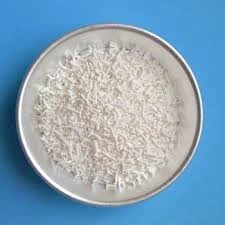
Understanding E263 Food Additive and Its Uses in Food Industry Applications
The Impact of E263 Food Additive on Health and Industry
Food additives play a crucial role in modern food production, enhancing both the safety and quality of a wide range of products. Among these additives, E263, also known as calcium acetate, is gaining attention in the food industry and among health-conscious consumers. In this article, we will explore what E263 is, its uses, potential health effects, and its significance in the food industry.
What is E263?
E263 (calcium acetate) is a calcium salt of acetic acid, classified as a food additive and recognized by various food safety authorities, including the European Food Safety Authority (EFSA) and the Food and Drug Administration (FDA). It is commonly used as a preservative and pH regulator in several food products. E263 is particularly valued for its ability to stabilize food pH levels, extending shelf life and ensuring that food products maintain their intended flavors and textures over time.
Uses of E263 in Food Products
E263 serves several essential functions within food production
1. Preservation Calcium acetate helps prevent spoilage by inhibiting the growth of harmful bacteria, molds, and yeast in food products. This makes it a valuable ingredient in a variety of packaged foods, including sauces, dressings, and canned goods.
2. pH Regulation Aside from its preservative qualities, E263 is effective in regulating the acidity levels in food. Maintaining the proper pH is vital for ensuring the flavor profile and texture of food, making E263 a popular choice among food manufacturers.
3. Nutritional Fortification As a source of calcium, E263 can contribute to the dietary intake of this essential mineral, promoting bone health and overall well-being. This aspect is particularly beneficial in processed foods where calcium may be lacking.
e263 food additive

Health Considerations
The safety of food additives, including E263, is a significant concern for consumers and health advocates. Generally, E263 is regarded as safe for consumption when used within established guidelines. The acceptable daily intake (ADI) levels specify how much can be safely consumed over a lifetime without posing risk to health. Complaints of adverse effects are rare, but some individuals may experience reactions due to specific sensitivities or intolerances.
It's crucial for consumers to remain informed about food additives and seek out transparent labeling on products. Awareness can empower consumers to make informed choices about their diet and health. While E263 is considered safe, excessive consumption of processed foods containing artificial additives may contribute to a less balanced diet.
The Role of E263 in the Food Industry
In the competitive world of food manufacturing, the use of additives like E263 allows for the mass production of safe, stable, and enjoyable food products. Food companies prioritize quality and shelf life, and E263 aids in achieving these goals. However, there is a rising trend toward clean labeling and natural ingredients, prompting some manufacturers to seek alternatives to synthetic additives. Consumers are increasingly versed in food science, leading to a demand for products that are less processed and contain fewer additives.
As a response, some companies are exploring natural preservation methods and looking for ways to reduce reliance on synthetic entities like E263. This shift reflects a broader movement in the food industry, aligning with consumer preferences for healthier, more transparent options. Nevertheless, E263 remains an essential tool in ensuring the safety and quality of many popular food products.
Conclusion
E263 (calcium acetate) is a multi-faceted food additive that plays a vital role in food preservation, texture, and nutritional quality. While it is generally deemed safe when consumed in moderation, consumers must stay educated about food additives and their potential health effects. In an evolving food landscape marked by a push for transparency and natural ingredients, the significance of E263 in food production will continue to be scrutinized. Nevertheless, it remains an important component in delivering safe and appealing food products to consumers, reflecting the ongoing relationship between food science, safety, and consumer demand.
-
Pure Sodium Dichloroisocyanurate Dihydrate | Powerful DisinfectantNewsAug.29,2025
-
Industrial Chemicals: Quality & Purity for Every IndustryNewsAug.28,2025
-
Nitrile Rubber Honoring Strict Production StandardsNewsAug.22,2025
-
Aspartame Ingredients Honoring Food Safety ValuesNewsAug.22,2025
-
Fertilizer for Balanced Plant NutritionNewsAug.22,2025
-
Cyanide Gold Processing with High Purity AdditivesNewsAug.22,2025
-
Formic Acid in Textile Dyeing ApplicationsNewsAug.22,2025
Hebei Tenger Chemical Technology Co., Ltd. focuses on the chemical industry and is committed to the export service of chemical raw materials.
-

view more DiethanolisopropanolamineIn the ever-growing field of chemical solutions, diethanolisopropanolamine (DEIPA) stands out as a versatile and important compound. Due to its unique chemical structure and properties, DEIPA is of interest to various industries including construction, personal care, and agriculture. -

view more TriisopropanolamineTriisopropanolamine (TIPA) alkanol amine substance, is a kind of alcohol amine compound with amino and alcohol hydroxyl, and because of its molecules contains both amino and hydroxyl. -

view more Tetramethyl Thiuram DisulfideTetramethyl thiuram disulfide, also known as TMTD, is a white to light-yellow powder with a distinct sulfur-like odor. It is soluble in organic solvents such as benzene, acetone, and ethyl acetate, making it highly versatile for use in different formulations. TMTD is known for its excellent vulcanization acceleration properties, which makes it a key ingredient in the production of rubber products. Additionally, it acts as an effective fungicide and bactericide, making it valuable in agricultural applications. Its high purity and stability ensure consistent performance, making it a preferred choice for manufacturers across various industries.





